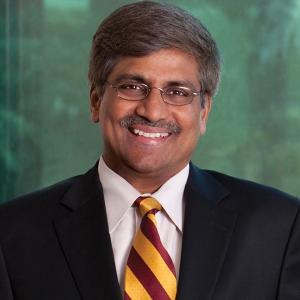By: Terri Edillon, Communication Specialist, NSF Office of Polar Programs

Sethuraman Panchanathan was sworn in as the 15th Director of the National Science Foundation (NSF) on 18 June 2020. Panchanathan was nominated to this position by President Donald Trump in 2019 and subsequently unanimously confirmed by the US Senate on 18 June 2020. He succeeds France A. Córdova, whose six-year term ended in March 2020. Dr. Kelvin K. Droegemeier was Acting Director at NSF during the interim.
Dr. Panchanathan, known as "Panch", has been a leader in science, engineering, and education for more than three decades. He has a distinguished career in both higher education and government, where he has advocated for knowledge enterprise development—advancing research, innovation, strategic partnerships, entrepreneurship, global development, and economic growth.
Panchanathan previously served as the Executive Vice President of the Arizona State University Knowledge Enterprise, where he was also Chief Research and Innovation Officer. He is also the founder and director of the Center for Cognitive Ubiquitous Computing at ASU. Under his leadership, ASU increased research performance five-fold, earning recognition as the fastest-growing and most innovative research university in the US.
Prior to joining NSF, Panchanathan served on the National Science Board as the chair of the Committee on Strategy and member of the External Engagement and National S&E Policy committees. Additionally, he served on the National Advisory Council on Innovation and Entrepreneurship. He was chair of the Council on Research of the Association of Public and Land-grant Universities and co-chair of the Extreme Innovation Taskforce of the Global Federation of Competitiveness Councils. Arizona Governor Doug Ducey appointed Panchanathan as Senior Advisor for Science and Technology in 2018. He was the editor-in-chief of the IEEE Multimedia Magazine and is also an editor/associate editor of several international journals.
Panchanathan's scientific contributions have advanced the areas of human-centered multimedia computing, haptic user interfaces, person-centered tools, and ubiquitous computing technologies for enhancing the quality of life for individuals with disabilities; machine learning for multimedia applications; medical image processing; and media processor designs. He has published more than 485 papers in refereed journals and conference proceedings, and has mentored more than 150 graduate students, postdocs, research engineers and research scientists, many of whom now occupy leading positions in academia and industry.
For his scientific contributions, Panchanathan has received numerous awards, such as Distinguished Alumnus Awards from several universities, and the Governor's Innovator of the Year for Academia Award for his development of information technology centric assistive and rehabilitative environments to assist blind and visually impaired individuals.
Panchanathan is a fellow of the National Academy of Inventors, where he also served as Vice President for Membership and Strategic Initiatives. He is also a fellow of the American Association for the Advancement of Science, the Canadian Academy of Engineering, the Institute of Electrical and Electronics Engineers, and the Society of Optical Engineering.
For further information on Dr. Panchanathan, please see:
"An optimist takes the helm at the National Science Foundation", and
The NSF Science Matters, Leader of AI breakthroughs, champion of innovation and inclusivity.
